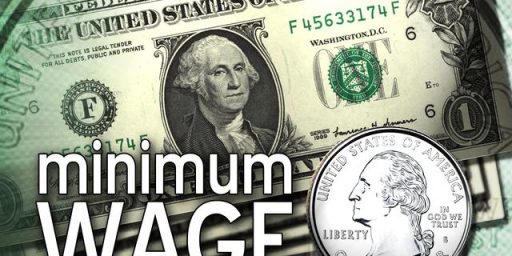Credit Claiming and the Minimum Wage
For better or for worse, it looks like we are on course for a 40% bump in the minimum wage–from $5.15/hr to $7.25/hr, whether or not it ends up being tied to estate tax cuts and other goodies for the GOP base. As both Jon Henke and Mike Munger note, empirical research in economics has shown little evidence for an effect on employment either way; that said, Henke finds Democrats’ favorite economist to be rather skeptical on the benefits of a minimum wage hike:
Paul Krugman has made two more important points on the topics. First, if you’re trying to help the poor, then “raising minimum wages is at best a crude and double-edged strategy”. It’s not targeted, it distorts markets and it leaves the neediest and least skilled without the higher minimum wage or the lower minimum wages. Second:
“So what are the effects of increasing minimum wages? Any Econ 101 student can tell you the answer: The higher wage reduces the quantity of labor demanded, and hence leads to unemployment. This theoretical prediction has, however, been hard to confirm with actual data. […] [T]he centrist view is probably that minimum wages “do,” in fact, reduce employment, but that the effects are small and swamped by other forces.”
Leaving aside the moral and efficiency objections to the minimum wage, I tend to doubt that a modest increase from current levels will lead to much unemployment, but it will certainly reduce the demand for labor over time.
Munger also discusses why the minimum wage hasn’t been indexed to inflation (unlike, say, congressional salaries):
Politicians wouldn’t be able to claim credit for an index, a one-time solution that actually fixes the minimum wage in real terms. This way, without indexation, they (the supporters) get to look like big heroes.
And, the more the increases get dragged out, and the bigger the consequent increase (which really only restores the minimum wage to its previous real value), the bigger the heroism. …
In short, the minimum wage combined with secular inflation is a nearly perfect job security device for liberal members of Congress: we will fight for a wage increase, for YOU! But we will not fight for indexation, which would make you outgrow your need for us. We need to be needed.
I tend to agree with most economists that hiking the Earned Income Tax Credit (essentially Friedman’s “negative income tax”) would probably be more effective in helping the working poor–in large part because the working poor are going to be most hard-hit after a minimum wage hike by the inevitable price increases (and/or reduced service) by low-cost retailers like Wal-Mart and KMart. If we’re going to have a state-mandated welfare program for low-skilled workers (whether we call it the “minimum wage” or “EITC”), I’d much rather see the burden fall on income taxpayers than disproportionately on those the wage hike is intended to help.






This bill was on my list of possible post topics, but your post allows me to focus on a comment instead, The bill is a typical combination of omnibus topics such that if you vote for or against it, fault can be found. There are seven (7) states where the opposition is massive because it declares a nationwide manner in which tips shall be handled.
In WA State, and 6 others, all service employers must be paid minimum wage (and WA State is the highest), and tips are to the employee (less disbursements to other service staff like bar backs, bus boys, etc). In the other 43 states, the employer may pay under minimum wage if the tips make up the difference.
So in these 7 states, a vote YES would mean a vote to reduce the wages of service employees hat receive tips (waiters, pizza delivery, etc). And the Feds are telling the states how to handle their non-interstate commerce (not to include bars and pizza joints on the borders).
This is so significant that the WA State Senators voted against this Omnibus, even though it would have extended the IRS deduction of State Sales Tax (at 8.5-8.8%) while other states are allowed to deduct state income tax (0% for WA). http://www.nwcn.com/topstories/stories/NW_080306WABminumumwagesEL.8302e83.html
(I think both deductions should be removed, and definitely see no reason why I as a WA resident with a high sales tax should subsidize another state, Oregon, with no sales tax, and a high income tax).
I used to live in a country where tipping was considered an INSULT, it means that the business obviously isn’t paying its workers enough. However, lately in the USA I see tip jars in fast food restuarants (and many other locations, like the gas station).